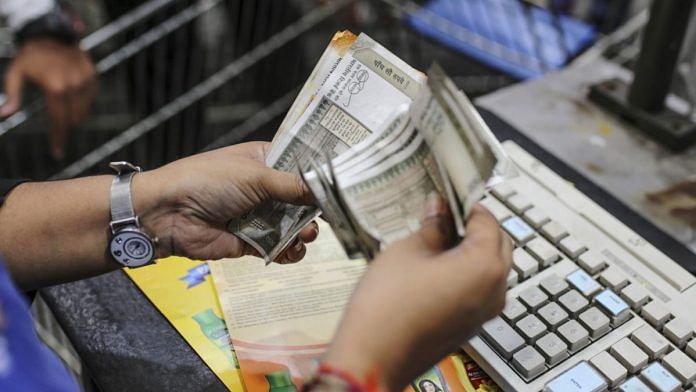
Mumbai: The Narendra Modi government has communicated to lenders its decision to waive the interest-on-interest burden for all retail and MSME borrowers of up to Rs 2 crore, including those who didn’t opt for the repayment moratorium allowed by the Reserve Bank of India (RBI) in March.
In the norms circular issued Thursday, the government has directed the lenders to credit the amount to the eligible borrowers before 5 November, ahead of 14-November Diwali.
All loan accounts that were standard and not non-performing, as on 29 February are eligible for the waiver. An account becomes sub-standard — the first category of NPA — if repayment is overdue for more than 90 days.
The benefit will be applicable to loans not extending Rs 2 crore, the government said in the circular, three weeks after it informed the Supreme Court about its decision to waive the compound interest. A copy of the communication was also marked to the RBI.
The decision has been taken in view of the “unprecedented” and “‘extreme” Covid-19 pandemic situation, said the government in the circular dated 23 October.
Borrowers of home loan, auto loan, education loan, consumer durables loan and personal loan to professionals with consumption loans and credit card dues and MSME borrowers will benefit from the waiver.
“…the central government has approved ‘scheme of grant of ex-gratia payment of difference between compound interest and simple interest for six months to borrowers in specified loan accounts (1.3.2020 to 31.8.2020)’. Benefits under the scheme will be routed through lending institutions,” said the circular. ThePrint has reviewed a copy of it.
For calculation purposes, the rate of interest would be the one that prevailed on 29 February and in case the interest rate has changed after that it will not be reckoned, the government said.
“The ex-gratia amount payment under this scheme shall be admissible irrespective of whether the borrower had fully availed or partially availed or not availed the moratorium on repayment announced by RBI,” the circular said.
The cost of the waiver is estimated at around Rs 6,500 crore, according to sources in the Ministry of Finance.
Submit bills
After the lenders credit the amount, they can submit a claim for reimbursement to the State Bank of India (SBI) latest by 15 December.
“SBI is advised to appropriately equip its designated officer(s)/ cell for processing the such claims in a timely manner, and to notify details of the same on its website,” the circular said.
“Issues and concerns relating to claims submitted by the lending institutions shall be handled through the designated cell at SBI in consultation with the government of India,” it added.
Borrowers of banking companies, non-banking finance companies, cooperative banks, regional rural banks and housing finance companies registered with National Housing Bank, will be eligible for the waiver.
The case before SC
While hearing a petition on waiver of interest-on-interest issue earlier this month, the Supreme Court had said it expects the implementation of the government’s decision to waive interest rate before the next hearing, scheduled on 2 November.
In an affidavit filed on 2 October, the government had told the court about its decision to bear the cost of interest on interest for retail and MSME borrowers, up to Rs 2 crore.
Experts have warned that the move could impact the government’s ability to recapitalise public sector banks, which are likely to see a rise in bad loans.
According to the RBI, the gross NPA ratio of scheduled commercial banks may increase from 8.5 per cent in March 2020 to 12.5 per cent by March 2021 under the baseline scenario and to 14.7 per cent under very severe stress.
Subscribe to our channels on YouTube & Telegram
Why news media is in crisis & How you can fix it
India needs free, fair, non-hyphenated and questioning journalism even more as it faces multiple crises.
But the news media is in a crisis of its own. There have been brutal layoffs and pay-cuts. The best of journalism is shrinking, yielding to crude prime-time spectacle.
ThePrint has the finest young reporters, columnists and editors working for it. Sustaining journalism of this quality needs smart and thinking people like you to pay for it. Whether you live in India or overseas, you can do it here.